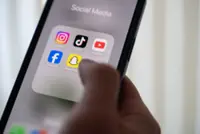Meta Platforms Inc, Google, TikTok and Snap will have to face lawsuits brought by school districts in federal court blaming their "addictive” apps for contributing to a mental health crisis among students.
The ruling Thursday by US District Judge Yvonne Gonzalez Rogers in Oakland, California, follows a contrasting June 7 decision by a Los Angeles Superior Court judge in favor of the companies. The split leaves the platforms potentially on the hook for damages in more than 150 cases before Rogers even as they’re poised to dodge liability for claims in more than 600 other cases filed in Los Angeles.
Rogers generally denied a request for dismissal of negligence claims, but narrowed the scope of allegations that will proceed. She concluded that some claims are barred by Section 230 of the Communications Decency Act, a longstanding federal law shielding internet companies from lawsuits.
Google and Meta spokespersons denied wrongdoing, saying their companies have taken steps to keep young users safe on the platforms. Snap also cited its safety initiatives and pointed to research showing that its Snapchat has a positive impact on the well-being of users. TikTok didn’t immediately respond to a request for comment.
The ruling comes just over a week after Rogers ruled that Meta must face a lawsuit by dozens of state attorneys general alleging it knowingly hooked kids on its Facebook and Instagram platforms. TikTok faces similar claims by a coalition of states. Both companies have denied wrongdoing.
The companies also face significant exposure from hundreds of personal injury suits accusing them of designing their platforms to encourage youths to spend unhealthy amounts of time on screens. But the school cases may carry bigger potential monetary damages because each district seeks to recoup institutional costs from the negative repercussions of having hundreds of individual students hooked on social media.
The school districts alleged that the companies engineered their platforms to addict kids by using algorithms and features such as the "like” button, in ways that hurt society – akin to cigarette manufacturers that designed their products to be addictive.
‘Compulsive use’
Rogers said the schools’ core legal theory was viable: the social media companies "deliberately fostered compulsive use of their platforms which foreseeably caused” the school districts to spend resources on combating the mental health crisis among students.
Google spokesperson Jose Castaneda said in a statement that the allegations aren’t true.
"In collaboration with youth, mental health and parenting experts, we built services and policies to provide young people with age-appropriate experiences, and parents with robust controls,” Castaneda said.
A Meta spokesperson said in a statement that the company disagrees with the court’s decision.
"We’ve developed numerous tools to support parents and teens, and we recently announced that we’re significantly changing the Instagram experience for tens of millions of teens with new Teen Accounts, a protected experience for teens that automatically limits who can contact them and the content they see,” according to the statement.
Lexi Hazam and Previn Warren, lead lawyers for the plaintiffs, hailed the ruling as a victory "for schools, teachers, and administrators who are on the front lines of the nation’s youth mental health crisis.”
"Because of the addictive design of Instagram, Snapchat, TikTok, and YouTube, students are struggling,” they said in a statement. "That means schools are struggling – their budgets are stretched and their educational missions are diverted as they shoulder the added responsibility of supporting kids in crisis.”
Public nuisance
The judge said claims by school districts based on legal theory of public nuisance – successfully employed against nicotine vape pen sellers – will be addressed separately.
University of Florida law professor Clay Calvert said the big payouts in the Juul litigation might have prompted plaintiffs lawyers to pursue similar theories in the social media cases.
"I think they see there’s potential out there from large settlements,” he said.
But the professor also there are fundamental differences between vape pens and social media, including First Amendment protections for the content posted on social media.
The Los Angeles and Oakland judges are overseeing separate batches of personal injury suits by youths and families alleging that the social media companies are responsible for causing widespread psychological distress and even suicides. – Bloomberg





